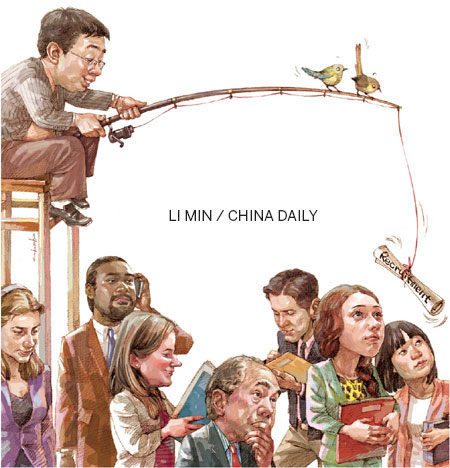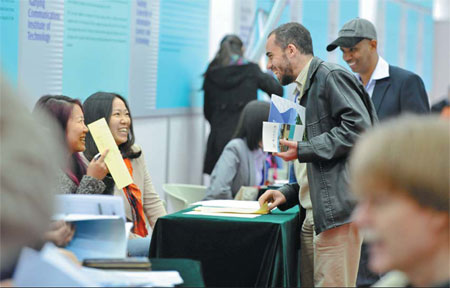Talent scouts must find, and also keep
Updated: 2013-04-26 08:33
By Chen Yingqun and Hu Haiyan (China Daily)
|
|||||||||||

|
Foreigners at a recent job fair in Nanjing, Jiangsu province. Provided to China Daily |
When the clock strikes midnight on April 30 and China starts celebrating International Workers' Day, it is also the deadline for entries in a talent contest in which the country tries to draw the world's brightest minds to work in its offices, universities and laboratories.
Thousands of applications that have poured in from around the world for the 1,000 Talents Plan will be scrutinized over the next few months, as China embarks on yet another program to attract more overseas talent to its shores.
What exactly drives the world's second-largest economy on such a massive search for talent? The answer lies partly in the recent rapid outbound moves by Chinese companies and the government push to shape China's growth on a knowledge-driven economy.
Through its far-reaching human resources policies over the last decade, the government has made clear its intention to lead the hunt for global talent. Local governments have not been far behind and have been competing with each other in the talent stakes.
North China's Tianjin municipality announced its recruitment plan for international talent in late March, with about 125 key universities, research institutions and enterprises offering 1,326 positions for top talent, compared with just 760 positions last year.
About 46 percent of the positions are at or above the level of associate professor and vice-chairman of companies, the Tianjin Municipal Human Resources and Social Security Bureau says.
Zhenjiang city in East China's Jiangsu province has implemented 20 favorable policies for the first time to help attract 200 foreign experts and 700 high-level talents with an overseas background in the next three years.
Shandong province has drawn up plans to establish another 10 recruitment liaison offices overseas, including in the US and Germany, to expand its channels for the recruitment of overseas talent.
The Donghu New and High Technology Development Zone of Wuhan city in Hubei province recently said it would offer incentives to those who successfully recommend high-level international talent to the zone, the highest reward being 240,000 yuan ($38,800; 29,700 euros).
Rapid growth
"China's hardware facilities like its infrastructure are in reasonably good shape after 30 years of solid growth," says Wang Huiyao, director of the Center for China and Globalization, which has focused on overseas talent studies for more than a decade. "However, it still lacks in software skills like managerial and scientific expertise. One major reason for the weakness is the lack of personnel with such know-how."
Wang says that Chinese companies looking to spread their wings in overseas markets or participate in international bidding projects are in strong need of international talent.
After the 2008 global recession, international talent has also set its sights on China. Spanish PhD student Mario Lanza is one of them. His aim is to find a permanent position at a Chinese university working in nanotechnology.
"China has offered good money and resources to attract talent from abroad, and indeed creates a very good environment for professionals like me to come and stay. Also in my case, I can also have access to some tools which young researchers don't have in our home countries," he says.
Fu Junsheng, division chief of the Information Research Center of International Talent under the State Administration of Foreign Experts Affairs, says: "Currently China's international talent attraction programs are led by central and local governments. Most of the top talent search programs are geared toward industries such as aerospace, new energy, bio-pharmaceuticals, life sciences and other high-tech industries."
In 2008, the central government launched the Recruitment Program of Global Experts, dubbed the 1,000 Talents Plan, to attract overseas professionals to the country's key innovative projects, key subjects and laboratories, high-tech industrial parks and state-owned enterprises and financial institutions.
In 2011, it launched the Recruitment Program of Foreign Experts, and plans to invite 500 to 1,000 high-end non-Chinese foreign professionals from other countries over the next decade.
Provinces, municipalities and autonomous regions have also started their own plans to introduce overseas professionals, such as Shenzhen's Peacock Program.
Overseas professionals recruited by the programs will be entitled to financial subsidies and favorable visa, taxation and wage, residence, medical care and insurance policies. For example, the Recruitment Program of Global Experts awards each foreign professional a subsidy of up to 1 million yuan from the central government, while scientific researchers can get a 3 million to 5 million yuan research allowance.
Moreover, governments have also offered favorable policies to encourage overseas Chinese to start businesses in China, which has also sparked a surge in overseas Chinese coming back.
The government is also considering a special visa for attracting talent and more steps to liberalize its issuing of permanent residency visas. It has also begun to induct foreigners into China's social security system, and now has more than 120,000 foreigners on its rolls.
The nation's 1,000 Talents Plan has attracted more than 3,300 experts, even as tens of thousands of highly skilled people have been drawn to the country in other ways. China has also set up 112 international talent recruitment bases and more than 260 business start-up centers for Chinese returning from overseas, the latter drawing 40,000 people, Xinhua News Agency reported recently.
Technology drive
Introducing international talent, especial high-level talent, has long-been recognized as an ideal way for Chinese companies to absorb advanced technologies, especially in the technology-based sectors.
The automobile industry, for instance, has been developing rapidly in recent years, but has been grappling with a severe high-end talent shortage. Several Chinese automakers, such as Chongqing-based Changan Automobile group, have been tapping the international markets to mitigate this problem.
When the financial crisis broke out in the US in 2008, many of its talented auto professionals were rendered jobless in Detroit. Pang Jian, vice-director of Changan Automobile Engineering Research Institute, was one of those Changan Group recruited from Detroit.
After working for Ford for more than 10 years at its US research and development center, focusing on the noise, vibration and harshness (NVH) sector, the chance to work in China offered a new life and more growth opportunities for the experienced engineer.
"The Western automobile industry is well developed and mature, yet the fast developing Chinese automobile industry, which is relatively less developed, attracted me very much," he says. "I wanted to change my life path and immerse with the development."
For Pang, 50, the group has been living up to the kind of promise it held for him when he first moved there.
"It was enthusiasm that brought me to China to work for the Changan Group," says Pang. "The phrase 'strong growth' sums up my experience and observation of the Chinese automobile industry since then."
As an expert in the NVH sector, Pang belongs to the 1,000 Talents Plan list. Changan has 12 experts whose names are on the list. These experts have brought in the much-needed advanced expertise to the group. For instance, under Pang's instruction and guidance, Changan's R&D strength in NVH has improved since 2008.
For some companies, what matters more are creative thinking and frontier concepts brought in by the overseas talent.
Mi Junren, deputy chief architect of the Beijing Institute of Architectural Design, a state-owned institute that has designed many of China's symbolic buildings, such as the Great Hall of the People and the National Center for Performing Arts, agrees with this point.
"Since China's reform and opening up began, many international design firms have participated in the designs of some big projects in China, which means we have to compete with both local and intentional companies," he says, adding that for the past four years, the institute has either hired or worked with about 10 foreign designers.
"When we work with international designers or designers who receive education overseas, their different mode of thinking and working methods are quite a change."
New Oriental Education Group, a Beijing-based private education provider, has attracted more than 500 foreign talents. Nearly 3,000 of its employees have overseas experience, and account for more than 10 percent of the whole group.
"Generally speaking, teachers with an overseas background will adopt more interesting and attractive teaching methods, which could be attractive for us to rope in students," says Zhang Ruguo, the company's HR manager.
To facilitate the recruitment of more overseas teachers, New Oriental group set up the foreign teachers' management center last year, and the group is eager to seek more management staff globally.
High-end challenge
High-level talent can also bring in new management styles as well as international enterprise culture for some companies.
It took three years for the Beijing-based Pulead Technology Industry Co Ltd, a company that focuses on lithium-ion batteries, to bring in an expert in the industry, Lahrs Thorsten, former CEO of Phostech Lithium Inc of Canada, to take up the position of vice-president at the company's Qinghai branch.
Ye Jing, HR manager of Pulead Technology, says that although the company spent a lot of money recruiting Thorsten, what he has brought with him is worth it.
"As a leading figure in the industry, there is no doubt that he is of immense help when it comes to technology issues," Ye says. "More importantly, he has also helped change our management styles and influence and cultivated a group of young technicians in the company with his serious working attitude and advanced technologies."
For other companies that want to expand overseas, what is needed is international talent that can best understand customers, help expand overseas channels and deal with the challenges posed by different cultures and legal systems in China and elsewhere.
Kang Lang, HR manager of the Shanghai-based conglomerate Fosun International Ltd, says the company attaches great importance to attracting international talent and started its hunt about three years ago when it saw investment opportunities overseas.
The company now has investments spanning Europe, the US and Africa, in several industries including travel, insurance and coal mining. At the company's Shanghai headquarters, there are about 400 workers, of whom 30 are foreigners and 90 are overseas returnees.
Dara Life Lounge of Beijing, a furniture company founded in 1998, has always employed foreign furniture designers, as most of its customers are people with an overseas background in China. It has employed about 30 designers, eight of them foreigners. More than 80 percent of its employees also have overseas experience.
"The design industry in China was relatively new, and there were not too many mature designers," says Zhang Jun, co-founder of the company. "Foreign designers can understand our international customers' needs better, and their designs go well with global fashion trends."
Fu Junsheng of the State Administration of Foreign Experts Affairs, says that his center holds at least four job fairs targeting foreigners every year in Beijing, Shanghai and Guangzhou. Last year, for each job fair, about 1,500 foreigners participated, of whom, more than 70 percent were from Europe and the US, while about 5 percent were from Africa, and the rest from other regions. Sometimes, foreigners would fly to China after seeing the recruitment website, he says.
Hiring benefits
In looking for international talent, companies may also need to rethink whether their recruitment methods are effective.

Wang Huiyao, the Beijing-based human resources expert, says Chinese governments and companies need to use more recruitment tools, apart from job fairs overseas.
Most highly skilled people do not rely on job fairs when they look for employment, so companies may find it hard to find the right people even after spending a lot of money and energy, Wang says.
"Overseas recruitment is more than releasing job vacancies or holding job fairs. Companies should think thoroughly about what kind of people they want and do careful research about where to find them."
Zhang Ruguo, the HR manager of New Oriental, says companies should consider several measures to rope in overseas talent.
Besides recruiting overseas talent through job fairs or agents, the group also uses the Internet, using services such as Linked-In and other micro-blogging sites.
Jiang Anyi, vice-president of Hay Group, China, says companies should be more particular about the qualities they look for in overseas talent.
"We cannot just say that we need foreigners to fill some positions. Instead, our managers should figure out what our requirements from them are, what kind of value we expect them to add and whether they will fit in with our long-term development strategies," he says.
The real challenge is to keep overseas talent motivated and chugging along, he says.
Jiang says cultural differences between China and other countries, including differences in leadership, working environment and working values, are often major reasons why Chinese companies are unable to retain overseas talent.
"In the West, leaders are more likely to listen, but in China, they are used to giving orders. While communicating, Chinese people are not as direct as Westerners."
Mi of the Beijing Institute of Architectural Design recalls that he was confused the first time he worked with foreign designers, as they would not accept temporary arrangement tasks or work at weekends.
Liu Haitao, head of office of the Shenzhen Overseas Chinese Pioneering Park, says: "Chinese people attach great importance to interpersonal relationships in doing business. But after being away for so many years, many overseas returnees don't have their social network here, so are unfamiliar with the current situation and way of doing business.
"So we need to offer training to help them acclimatize to the local situation," Liu says.
Claire Yang, managing director of consultancy firm Accenture China, says that unlike international companies, Chinese companies have a less well-organized internal structure and less standardized managing systems.
In many Western companies, employers and employees' rights and obligations are specifically stated, and performance appraisal systems are sound, she says. However, many Chinese companies lack such systems, which leaves overseas recruits feeling uncomfortable.
Yang says Chinese managers need to learn to be more tolerant. They should also adopt a more effective performance inspection and drive mechanism and go for more tailored professional training to retain talent and help them develop a career, she says.
Liang Xinghui, vice-chairman of Hay Group, says many companies have developed strategies to retain international talent for three to five years or even seven to eight years. One effective way is to attract international talent in groups.
"One talent with different cultural values and styles will feel uncomfortable with the local team and is less likely to influence them. But a group of foreigners can create a more familiar environment and have more impact on local employees," he says.
Networking problems
Apart from these, there are also some problems that may affect overseas recruitment, such as a lack of a network for talent, visa issues and pollution in big cities.
Liu Zhenguo, head of HR for the Beijing Institute of Architectural Design, says the institute started to recruit Chinese returnees from overseas in 1982, and it relies on personal connections abroad, as there is no standardized platform for hiring talent from overseas.
"There are some foreign talents who don't have a long-term work plan and just want to come to China for a short time. But getting a visa for such people often takes more time than expected and we often have to forego such opportunities," Liu says.
Wang Huiyao, the international talent expert, says China is still short of highly skilled people from overseas, and one way for it to fill the gap is to adjust immigration laws and regulations. At the end of last year, the country had granted permanent residency to just 6,000 people, whereas the United States grants 140,000 green cards every year, he says.
Chen Xin contributed to this story.
Today's Top News
Alibaba pays $586 million for stake in Sina Weibo
Three buried after lab explosion
EU to ban pesticides blamed for harming bees
City unites to say farewell
Small stores rely on new retail revolution
Taobao creates new job specifications
Beauties turn entrepreneurs
Flooding season nears in Ya'an
Hot Topics
Lunar probe , China growth forecasts, Emission rules get tougher, China seen through 'colored lens', International board,
Editor's Picks

|

|

|

|

|

|






